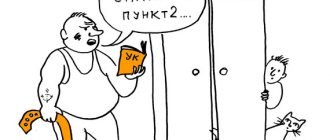Times change, people and relationships between people change. What previously seemed completely unacceptable is now considered the norm. Until recently, the teacher was seen as the unchanging authority for his students. It was impossible to imagine a situation where children could take any liberties with the teacher.
Now everything is different. You can often encounter a situation where students behave inappropriately with a teacher and may call him names or insult him. What should a teacher do in this case and is there an article in the law for insulting a teacher by a student?
What is personal insult
First, a little theory. What is personal insult? These are actions of one person towards another that humiliate a person, insult his honor and dignity.
Insults can be expressed verbally. That is, these are various offensive words and phrases, obscene language. Personal insults can also be expressed in the form of obscene gestures, slaps and spitting. An insult can be personal, that is, face to face, or it can be public, when there are witnesses to the humiliation inflicted.
Currently, the perpetrator can be held administratively liable for personal insult. The punishment in this case will be a fine. But this all applies to adults, adult citizens. If we talk about school, then according to the law it is quite possible to hold a teacher accountable for insulting a student. You can easily find parents who have exercised this right.
But the opposite situation is quite possible. A student insults a teacher. In this case, it is also impossible to remain silent and pretend that nothing is happening. You need to know the legal methods of influencing a child. Otherwise, instead of restoring justice, you may end up on trial yourself.
How to protect a child from teachers?
When talking with a teacher, be prepared for the fact that he will explain everything to you very clearly: he will explain his actions by the child’s behavior, the child’s behavior by the characteristics of his own personality, and your reaction by ignorance of the entire situation. After listening to the teacher’s version, be prepared either for his aggression, or for cold indifference, or for tears and pressure for pity.
The work of a teacher is indeed very hard work, requiring a huge amount of internal resources. I do not at all set myself the goal of devaluing the feelings or merits of teachers. But none of the above gives them the right to hurt your child. You can treat the teacher with understanding, and perhaps he will not be a bad person at all - but this does not mean that you should withdraw your complaints. Your demand to stop putting pressure on your child should still remain in force.
Be prepared for the fact that during the proceedings it will suddenly become clear that your child is not an angel, and all sorts of “atrocities” are behind him. Usually this trump card is played last, to show you “who you are protecting now.” If this happens, then, although this does not apply to the situation that you came to deal with, still take note and check. And if it turns out that you were told the truth, it means that the child has behavioral problems that you did not know about before, and these problems need to be solved. After all, this is your direct responsibility as a parent.
If during your conversation you do not come to an agreement, then there is always the school administration, which really does not like it when its employees offend children. Once again, I note that you should contact the management not first, but last, because you will still have to find out what happened with a particular teacher, but he, knowing that you started by complaining about him to his superiors, will be biased towards you . There is a very fine line between protecting your child and trying to change the teacher. Limit yourself to the first, because the second is most often impossible.
Another link between the teacher and the administration is the school psychologist. It is clear that not all schools have him, and, unfortunately, he is not always competent enough, but you can also turn to him with a request to resolve these relations. The psychologist has advantages: he is not a boss, not a subordinate, and not a colleague for teachers, but nevertheless he is in a special position and reports directly to the school director. At the same time, he has psychological knowledge and the skill of conveying the desired thought to a person. In addition, he knows teachers well and can often testify to how real what is being discussed is. You shouldn't give up such a useful ally if you get the chance.
What the law says
In schools you can often meet cruel and aggressive children.
As a rule, they grow up in dysfunctional families and have big flaws in their upbringing. Such children often become a real headache for both classmates and teachers. They allow themselves not only to abuse their peers, but may also take such an unacceptable step as insulting a teacher.
Previously, insult was considered a criminal offense. Currently there is no such article in the Criminal Code. Punishment for offensive actions is provided for in the Code of Administrative Offenses. That is, such a crime is punishable by a fine. But the Code does not apply to minors.
Thus, if the insult is so serious that the teacher wants to punish the offender, it is not possible to do this through the court. Even if an application is written to the court or the prosecutor's office, the judge will reject it as contrary to the law.
The only thing you can try to do is file a lawsuit demanding compensation for moral damage from the parents of the offending student.
When a teacher crosses boundaries
“In 11th grade, I spent a lot of time studying and preparing for the Olympiads in order to enter a university on a budget. Due to the heavy workload, I had nervous breakdowns, so I gained a lot of weight. On Saturdays, we had a physical education lesson at eight in the morning, and sometimes I skipped these classes in order to get some sleep.
One time I came to the gym, and my teacher took me to the center and began to scold me in front of the whole group for skipping classes, with the phrase: “You can skip math, but definitely not physical education.” Have you looked at yourself in the mirror lately?”
Now I’m already in my third year of university, I’ve lost a lot of weight, and I have a boyfriend, but still every time I eat too much, I remember that phrase and run to the scale. I’m constantly afraid of gaining weight, because then they might say to me again: “Have you looked in the mirror lately?” This haunts me even after four years and more than 40 hours of communication with a psychologist,” says Anna, a graduate of the Yekaterinburg gymnasium.
Because of the teacher's criticism, the child runs the risk of becoming unsure of himself or doubting the correctness of his choice.
“I have been swimming since the first grade and always dreamed of becoming an athlete, so in the 11th grade, when choosing a university, I had no doubt that I would go into physical education. When applying, it is more important to provide good results in swimming, rather than excellent Unified State Exam scores, so I devoted more time to training.
One day, the class teacher decided to have a conversation with me in a raised tone about the fact that I still wouldn’t make a great athlete and I wouldn’t be successful in swimming. She asked me to study and discard “stupid” thoughts about swimming. I hated school because she said this to me every time we saw her, so I turned to a psychologist.
Now I’m going to the Russian Championship and I’m very glad that then her words didn’t break me and didn’t force me to give up my dream. But many of my friends, to whom teachers told the same thing, alas, listened to the “good” advice and went to study in other specialties,” says Dmitry, a graduate of the Chelyabinsk school.
Some teachers try to deal a painful blow to children's self-esteem.
“I dreamed of becoming an architect, so in the 11th grade I definitely decided that I would take specialized mathematics at the Unified State Exam. However, my teacher laughed out loud after I told her about this and said that I was unlikely to be able to pass even the basic level.
At first, I decided not to pay attention to her ridicule, but she took the tests in specialized mathematics from me and gave me the basic version on “samples”, did not tell me about the postponement of elective classes, and right on the day of the exam she wished me at least a minimum score. I burst into tears right at the entrance to the school - my hands were literally shaking from fear of not passing.
In the end, I managed to score 88 points (the average passing score is 50), but I still consider myself weak in this subject. At the university, during mathematics classes, I try to sit in the back desks so as not to go to the blackboard,” says Violetta, a graduate of the St. Petersburg school.
What can be done
What to do in a situation where a student insults and humiliates a teacher? What is the right thing to do in such a situation? Of course, the most important thing is not to stoop to the level of the offender and try to take revenge using his own methods. There is no need to insult the student in response. Because, as stated above, the student will escape responsibility, but the teacher may get the full price.
What can an offended teacher do? Inform the child's parents and school management about the incident. Don't try to solve the problem one on one. We must try to collectively understand what happened. You can gather a pedagogical council on this matter. As a result, the student must ask the teacher for forgiveness.
If this is not an isolated case of this kind, it may be worth paying closer attention to this child. There may be a need for psychologists and social educators to work with the child. After all, if such behavior is not stopped at the initial stage, the further development of events can be completely unpredictable.
These are the most frequently used and, at the same time, fairly loyal methods of influence. If the situation is not very advanced, they may well help correct the current situation.
Tips on where to turn if the site turns out to be fraudulent.
And here are the features of bankruptcy of a municipal unitary enterprise.
Juvenile Affairs Commission
What if the methods described above did not produce results?
Or are the circumstances of the insult so serious that the teacher certainly wants to achieve justice? The teacher has the right to appeal to the Commission on Minors' Affairs. This is a permanent body operating in each region. Its main function is to protect the rights of children and prevent the development of crime.
So, if a minor has committed an offense that is considered an administrative offense, this is a good reason to contact the CDN. And personal insult is precisely one of these violations.
When the Commission receives a complaint, its staff must investigate what happened. It is necessary to form an objective picture of what happened. And if there are enough reasons, the troubled child will be registered.
Of course, if the student’s guilt is not proven or this was an isolated incident, then no one will register anyone. But if a child regularly commits unlawful acts or has a dysfunctional family, then most likely the KDN will make a decision not in favor of the student.
Registration is a serious reason for a student to think about his behavior, because now all his actions will be under close attention. And perhaps he will be on the path to correction. And the teacher’s thirst for justice will be satisfied.
Where does teacher rudeness come from?
Some teachers allow themselves to bully, “tease” a student, treat him rudely or harshly, knowing that he will not come into conflict with the teacher and will not respond to bullying.
The reasons why a teacher takes it out on a child can be different.
Pedagogical incompetence and short-sightedness.
There are teachers who practice an imperative style of communication with the class: they demand strict obedience and use psychological pressure. They are rude to children because they sincerely believe that this is the only way to achieve discipline.
Professional burnout.
A teacher who has lost interest in the profession becomes cynical, allows himself to raise his voice and communicate with any of the students with disdain.
Revenge in response to lack of respect from a student.
If a child does not treat the teacher or his subject with due respect, he lowers grades, insults or puts the student in an unfavorable light.
Personal animosity.
It also happens that a teacher treats a student poorly for no apparent reason and the situation cannot be affected by any actions of the victim. The traumatic behavior of a teacher causes irreparable damage to the psyche of a student of any age.
What is difficult behavior and how does it happen?
Challenging behavior is behavior that interferes with the child's learning and relationships with others, causes harm to the environment and things, and creates risks for the child, peers, adults and other living beings. From this definition it is clear that not only those around them suffer from difficult behavior, but also the child himself who behaves this way.
Since the child himself suffers from this, it is very important to help him, support him and teach him to act differently. Because this is not a difficult child, but a child who is having a hard time.
There are many different types of challenging behavior: failure to complete homework, skipping classes, risky behavior, smoking, substance use. Sometimes this is aggression and bullying - when a child expresses his strong emotions in destructive ways that hurt others, damage things and create psychological discomfort.
Will you protect me? Allow your kids to complain!
I don’t know when or who came up with this, but such a belief has firmly taken root in the children’s subculture, both preschool and school. Variations of the belief: “snitching is ugly,” “informer,” “snitch-sniffer.” Moreover, this idea is conveyed not only by children to each other, but also by some parents: “Don’t complain to me! Learn to solve your problems yourself!”
There are so many psychological traumas that happen because of this “it’s not good to complain.” The child is being bullied. He cannot defend himself. And he can’t complain, because there is a ban on complaining. Some children endure bullying from classmates for years, but do not complain. Please allow children to complain!
As the owner of a small Chihuahua dog, I have the opportunity to observe the different ways she interacts with the world while walking. She chases pigeons with a loud bark, rejoicing that at least someone is afraid of her. She sniffs the Yorkie curiously, then wags her tail and jumps around, inviting him to play.
He becomes wary and freezes when a child approaches, because he does not understand what to expect from him: will he just pass by or will he try to pet him? He raises his head at me, as if asking with his gaze: “You will protect me, right?” But if my Chihuahua sees a large dog, he quickly runs away from it and asks for protection in my arms. That is, she demonstrates different response models: attack, freeze, run away, seek protection - and all this is about “protect yourself.”
To run away and hide is also to avoid being offended. It would never have occurred to me to teach a tiny Chihuahua to attack a large dog. This seems obvious. But why then, when raising children, do we so often ignore the fact that children are different, including in height and strength, and teach them a universal model of behavior: “Don’t complain. Know how to stand up for yourself. Give back."
Have you seen what that boy (offender) looks like, whom you advise to fight back? The instinct of self-preservation tells the child not to fight back. At the level of instincts, he also has different response patterns. Follow instinct or listen to parents? Should you approach your parents again with your problem? But he will hear again: “I already told you, give it to him properly and don’t complain anymore.”
The child stops complaining. The parent is convinced that the problem has been solved. But the child simply stopped complaining. Although he still cannot fight back. Tolerates.
What to do if a child is bullied by a teacher at school?
All of the above related to working with one specific teacher. If there are several such teachers, then this does not change the essence of your actions, and each of the teachers must be dealt with separately.
So the algorithm is very simple. First, you find out the circumstances of the child and, based on your conversation with him, draw conclusions about how much this situation requires you to go to school. After all, if you are scolded for lack of homework, then it is much easier and more useful to start monitoring its completion.
If everything is more complicated, then contact the teacher with a request to clarify the situation. You shouldn’t start with accusations - it’s better to express your concern for the fate of your child. By the way, it is advisable to do this at least once a month, even without special reasons.
If the conversation with the teacher is unsuccessful, then seek the support of a psychologist or administration to look into it more seriously. Listen and take note of their demands and comments about your child's behavior, but remember that your goal now is to protect him.
After talking with the administration and the offending teacher, you can only take an interest in the child’s affairs at school and control those aspects of his school life for which you are responsible: homework, appearance, attendance and behavior at school.










